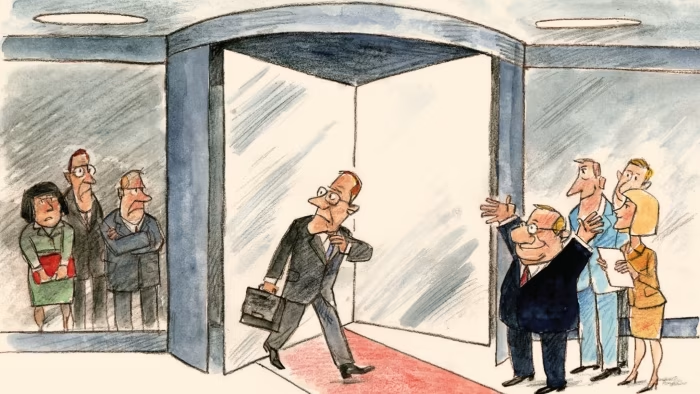
Revolving doors: Cases of public officials subsequently employed by the companies they supervised



On 12 February 2025, Solomon published a report highlighting cases of Greek public officials who, within a short period of time after leaving public office, took up a high-level position in the private sector and more specifically in a company supervised by the state authority they had previously served.
According to the report, Mr.Nikos Mantzoufas served as the Governor of the Special Service for the Coordination of the Recovery & Resilience Fund from November 2020 to July 2023, before being hired in January 2024 by the Sunlight Group, which had secured €245 million in funding from the Recovery and Resilience Fund for investments, including a lithium battery production plant in Western Macedonia. (This investment was eventually cancelled.)
The report also cites the following similar cases:
Although Greek law provides some measures to avoid conflicts of interest in government offices and high public positions, it does not effectively cover all cases of revolving doors. Law No. 4622/2019 (Articles 68-76, Government Gazette Α’ 133 / 7.8.2019) provides that for those persons appointed as members of the government and deputy ministers, the exercise of any professional or business activity is automatically suspended. Additionally, members of the government and other high ranking public officials seeking to engage in professional activity related to the activity of the public body in which they served within one year of their departure from that role, must obtain a permit from the Ethics Committee of the National Transparency Authority (NTA).
It should be noted that the report of the Fifth Evaluation Cycle of the Council of Europe’s Group of States against Corruption (GRECO) recommended that some aspects of the model of transfer to or from the public to the private sector be strengthened and that a review of the post-employment scheme should be undertaken, with a view to assessing its accuracy and strengthening it by broadening its scope, as regards persons with high executive functions.
Regarding the shortcomings of Greek legislation in the management of cases of conflicts of interest and revolving doors, Vouliwatch Director Stefanos Loukopoulos told Solomon that the problem lies not only in the legislation itself, but also in the implementation and monitoring of the application of the laws. Loukopoulos also pointed out that, “the data submitted to prevent cases of conflict of interest, as well as the data on the monitoring carried out by the competent bodies in this sector, are not generally public, not even in the form of statistical representation.”
Solomon noted that problems in Greek legislation on conflicts of interest are also highlighted by Transparency International-Greece, whose President, Giorgos Hatzigiannakis, told Solomon that one of the gaps concerns the unequal treatment of transferred employees, depending on who appoints them – either a Minister or the administrator of a Body governed by public law such as the National Health Services.
The Organisation for Economic Co-operation and Development (OECD), in its 2024 recommendations to Greece on preventing and addressing conflicts of interest, proposed a framework for revolving door cases with uniform policies for cooling-off periods and a complete ban on former civil servants from working in companies related to their previous duties.
Under the rule of law, states should provide specific measures to transparently and effectively deal with all cases of revolving doors and conflicts of interest.
However, as this case shows, Greece has not yet adopted a comprehensive legislative framework covering all these cases, as is evident from the GRECO and OECD recommendations.
The lack of such measures may make it easier for private interests to exert control over public authorities, with the consequent risk of private interests being satisfied to the detriment of the public good and citizens’ interests.
Bank Account number: 1100 0232 0016 560
IBAN: GR56 0140 1100 1100 0232 0016 560
BIC: CRBAGRAA
![]()
In a time where the very foundations of democracy are gradually being eroded by the rise of extreme nationalism, alt-right movements, the spread of disinformation and corporate capture, the efforts of organisations such as Vouliwatch are more relevant than ever.
We rely on the generosity of each and every one of you to continue with our efforts for more transparency and accounta
By financially supporting Vouliwatch you support our litigation strategy, our campaigns for transparency and accountability in the political system, the development of new civic tech tools, our research projects and last but not least our impartial and accurate